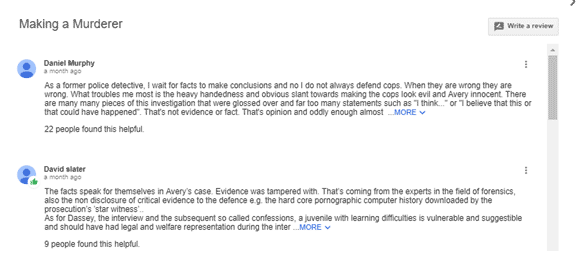Is Google’s Latest Patent to Predict Intent of a Search for a Particular Context Good for Users?
Google has been tailoring its search results based on what it knows about users since 2005, when personalised search launched for people signed into their Google account. In 2009, Google rolled that change out to all searchers, logged in or not and, since then, every update has been a step towards a stated aim to make each search results page as relevant as possible for each user – a trend reflected in 2018’s big algorithm updates.

Personalised Search in a Nutshell
Personalised search, as the name suggests, means that the search results Google presents are tailored to each user. At the moment, this includes factors like where they are, time of day, what sites they like to refer to and whether they’re on a desktop or mobile phone.
However, Google has just filed a patent to help them go a lot further, using a lot more data, to better predict the intent or purpose of each search, based on the context of the individual user to present the most relevant personalised results.
The aim is to understand why someone may be searching for a specific term, when their query doesn’t reveal that information, and give them the most relevant results first time to improve user satisfaction and reduce server loads from query refinements.
For example, someone searching for “Canon 5D Mark IV” could want reviews of the camera, or to compare prices for it if they’ve decided to buy it, or to actually buy it, or to find manuals and advice if they’ve bought one already.

Google’s Patent Goes Super Personal
In many ways, this is the next step that continues the journey from the clunky, illogical search results of the old days of the internet to a happy future where your device just knows what you want and gives it to you. We’ve seen semantic search, local prioritisation and mobile prioritisation all affect the SERPs to increase relevance.
What Google’s new technology will actually look like remains to be seen but the patent cites all the following as points of data it might use (strap yourself in…):
The search results have become like the high street and it’s always the same big faces time after time. Billions of sites and trillions pages but I’m stuck seeing the same 50.
- A user interest graph or some other type of data structure
- Contact information associated with users (e.g., a user’s personal contact information as well as information about a user’s friends, co-workers, social media connections, family, etc.)
- Search histories
- Location histories
- Calendar information
- Application use histories
- Purchase histories
- Favourites and bookmarks
- Phone information including positions of switches, battery levels
- Whether a device is plugged into a wall outlet or another device and
- An acoustic fingerprint
- A video fingerprint
- A location
- A movement trajectory
- A direction
- A speed
- A name of an establishment
- A street address
- A type of place
- A building
- Weather conditions
- Traffic conditions
- A calendar event
- A meeting, or other event associated with a location and/or time
- A webpage address viewed at a particular time
- One or more text entries made in data fields of the webpages at particular times including search or browsing histories
- Product purchases made at particular times
- Product wish lists
- Product registries
- Audio and/or video accessed by or being broadcast in the presence of the computing device at various locations and times
- Television or cable/satellite broadcasts accessed by or being broadcast in the presence the computing device at various locations and times
- Information about other services accessed by the computing device at various locations and times.
From this not even slightly invasive list, the patent gives the example of how when someone searches for a film by name and buys tickets for a screening, when they next search for the same movie, Google will know they’ve already bought tickets and will bump up results not related to buying tickets, such as reviews, news and memorabilia. Or, to use my example, the top results for “Canon 5D Mark IV” could move from being informational and review sites to retail sites and price comparison tools to forums where owners swap tips.
Why This Will Be Horrible for Users
OK, so Google’s new search baby isn’t even born yet, but I’m going to call it ugly. (For now, I’m a reasonable man.)
Why? Three main factors:
1) It Won’t Be Clever Enough
While search has got better in many ways since personalisation, it has in recent years started to feel like you see the same brands and media sources again and again. The search results have become like the high street and it’s always the same big faces time after time. Billions of sites and trillions pages but I’m stuck seeing the same 50.
Better understanding the intent of my search might help reduce the refinements I have to make to a search term but it won’t substantially change the top-ranking destinations. More likely, Google will make common assumptions about common behaviours and create identikit journeys using common data.

So, yay, when I land on holiday in Seville, Google might give me some results about nearby restaurants from a generic search on food without me having to type so much, but they’ll still just be the top restaurants on TripAdvisor which means they’ll either all be full or among the many overrated restaurants that somehow dominate TripAdvisor.
Google’s Assistant already knows where I’ve been on any given day and my favourite restaurants (based on repeat visits) and still can’t seem to recommend anything worthwhile. How is this going to be any different?

2) Facebook – Or How You Get What You Want, Not What You Need
With a wealth of information on its users, from demographics to interests to sentiments on different ideas, Facebook’s feeds have been trying for a long time to develop a personalised experience that gives you more of what you want – and the more they’ve done, the worse it’s become.
And now, Google+ is finally dying a death but Google has enabled commentary on search results, turning the SERPs into a forum for everyone
Think of how Facebook seems to suppress people you haven’t interacted with as much to the point that they disappear from your feed until, finally, you search for someone specifically and discover they’ve been posting all along and are now re-married with six kids and running a llama farm. Or how once you interact with someone’s post, Facebook shows you their every post every second.
Well, that’s the new SERPs. Click on something and watch your search experience become a homogenous smear of sites Google has decided you like, burying old sites that you haven’t interacted with enough and making it harder to unearth new results or different voices.
And that’s not even entering the thorny debate on politics. Facebook’s echo chambers have become the stuff of media legend and credited with enabling the rise of the popular right. My own Google feed struggles for diversity yet screams for attention to try keep me reading it; I don’t need this tunnel vision applied to the whole web.
3) It’s Really About Advertising
In my predictions for 2018’s search trends last year, I suggested this would be the year that “Google relaunches its social platforms, not as a direct Facebook competitor, but as a rival to every local information site and forum going. Think TripAdvisor meets Yelp with a splash of WhatsApp or Instagram.” The aim: to collect more data like Facebook for greater advertising opportunities.
And now, Google+ is finally dying a death but Google has enabled commentary on search results, turning the SERPs into a forum for everyone – and creating an even better way for people to directly tell Google how they feel about things.

Hey Daniel Murphy, nice to know you’re a former police detective, tell me more…
Add all the extra data Google is looking to use and that’s some super effective targeting. Consider that in 2017, Google made $95.4bn from ad revenue – 86% of their total revenue – while Facebook made £39.9bn from ad sales. That’s $40bn I’m sure Google would like a slice of.
With this move, Google knows if you’re on your phone, at home, browsing terms it thinks are related to Love Island, while it knows that Love Island is on TV being sponsored by Superdrug. That makes prime media space on Google for both Superdrug and their rivals to reach second screeners – and that’s going to come at a premium.
Or, for another example, it knows what’s on my wishlist at various stores, it knows when my birthday is, it knows who my friends are and if there’s an event in our calendars that looks like we’re getting together, hey presto, my friends will start having my wishlist contents advertised to them.
Similarly, Google has been making strides to make advertising easier to get into for different user groups while also reducing the level of control an advertiser has over the terms they want to be visible for. Or, restated: Google has been trying to make more money from advertising and being able to offer this level of detail, targeting and relevance makes their advertising platforms all the more robust to challenge Facebook.
Why This Will Be Awesome for Users
And now for some balance…
1) Opening Up the Online World
This patent could signal a real shake-up to Google’s ability to understand a searcher’s wants and expectations of a set of search results for a query, making its whole offering from search to Assistant that much more valuable to bring you the information you need, when you need it, in the best possible format.

If the SERPs have become the high street, this could open up the quirky backstreets again for people who are looking for them, filtering out or down-weighting results that are less likely to please. If I don’t like chain restaurants, Google will know that when I search for “pizza” at 8pm in a new city that I’m most likely looking for a place to get a pizza for dinner rather than the history of pizza. It can then direct me to a local independent place first rather than Pizza Express. It will also know my tolerances for walking and if I’m happy to go a little further to get a better pizza, so the local results will be smarter than just distance and reviews in recognised platforms. And then it will know that it’s currently raining where I am and suggest places that offer delivery.
2) Finding the Right Audiences
If Google can truly understand intent at an individual level and crunch its data to create individual search journeys, it vastly opens up the potential of search to connect people, information and businesses effectively.
In our approach as a search marketing agency, we put the target audience at the heart of our campaigns. Every piece of content we create onsite or in advertising or place offsite, starts by asking who are the best potential customers for a business, what are they looking for and how do we reach them?
This new technology could help better unearth new audiences, filter out people who aren’t as interested or are not in the right stage of their journey to see the content we have. Truly relevant advertising is a valuable form of brand communication and there is the potential here for advertising in particular to suggest the right things at the right time.

3) Quality is King
If search is truly personalised, what does a ranking mean? How can you be number 1 for a keyword when everyone sees something different?
For a long time, SEO has focused on keywords, set rankings and the methods to be at the top of those rankings either through lazy hacks (the old days) or an ever more rigorous approach to creating a quality-based experience for users.
If the rankings are blown open to an individual level, businesses will have to focus more and more on sets of data around users, sessions, engagement and conversions, prioritising tactics that make the best experience and communicate relevance clearly for their target audiences so that Google can connect them. As a result, the internet could be a better place to visit and step back towards the sense of an open and free web that its inventor, Tim Berners-Lee, envisaged.
Follow my contributions to the blog to find out more about marketing in a digital world, or sign up to the ThoughtShift Guest List, our monthly email, to keep up-to-date on all our latest guides, advice and blog posts.
References:
- https://googleblog.blogspot.com/2005/06/search-gets-personal.html
- https://googleblog.blogspot.com/2009/12/personalized-search-for-everyone.html
- https://www.statista.com/statistics/266249/advertising-revenue-of-google/
- https://www.statista.com/statistics/271258/facebooks-advertising-revenue-worldwide/
- https://www.adweek.com/digital/facebook-raked-in-9-16-billion-in-ad-revenue-in-the-second-quarter-of-2017/
- https://gofishdigital.com/query-intent-contextual-histories/
- https://patentscope.wipo.int/search/en/detail.jsf?docId=US233551689
